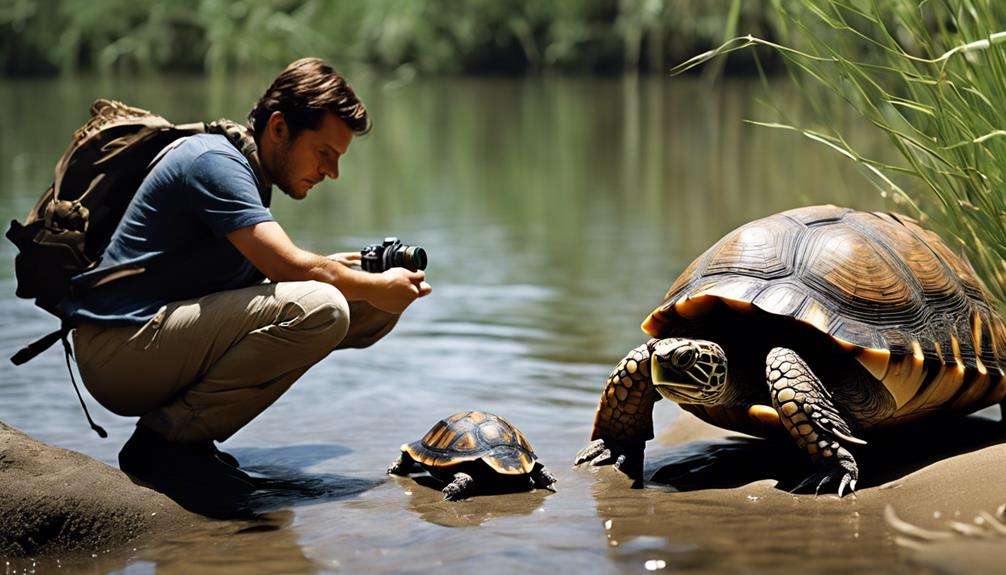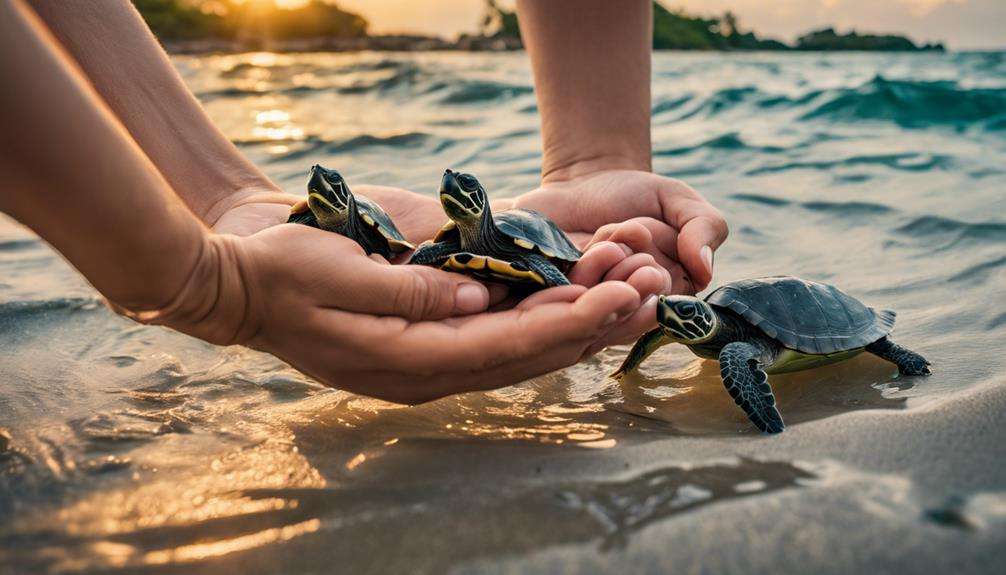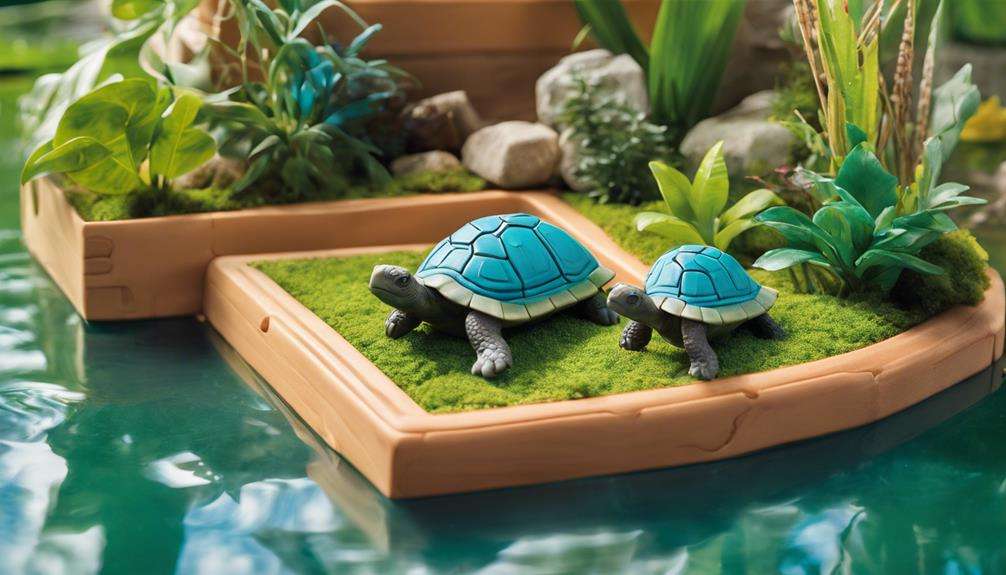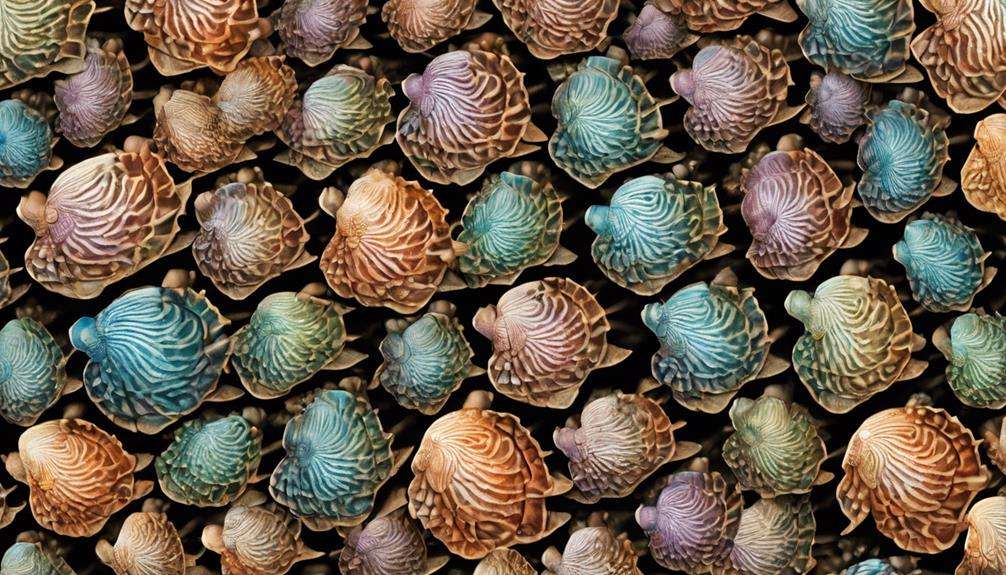Ensuring your pet turtle's well-being involves mastering unique care strategies tailored to their specific requirements. From selecting the ideal species to creating a suitable habitat and providing a balanced diet, each element contributes to their overall health.
But there's one important aspect often overlooked, a secret to revealing your turtle's best health that many overlook. It's a practice that can make a significant difference in your pet's life, elevating their well-being to new heights.
Key Takeaways
- Provide a 40-gallon tank with land and water areas for movement and rest.
- Offer a balanced diet with protein, plant matter, and essential nutrients.
- Incorporate enrichment activities like obstacle courses and basking docks for natural behavior.
- Handle turtles gently, avoid stress, and prioritize regular veterinary check-ups for optimal health.
Rare Turtle Species Overview
Rare turtle species, including the Madagascar big-headed turtle, are in a precarious state of endangerment primarily because of habitat loss and the illegal pet trade. These unique turtles, such as the Roti Island snake-necked turtle from Indonesia and the Mary River turtle from Australia, face significant threats from poaching and habitat destruction. The illegal pet trade further exacerbates their vulnerable status by disrupting their natural populations.
In places like Indonesia and Australia, conservation efforts are essential to protect these rare turtle species from disappearing entirely. Poaching remains a constant menace, putting additional pressure on these already fragile populations. The importance of addressing habitat loss, combating the illegal pet trade, and implementing effective conservation strategies can't be overstated in safeguarding the future of these extraordinary creatures.
As we work to preserve these rare turtle species, it's imperative to raise awareness about the threats they face and to take meaningful action to guarantee their survival in their natural habitats.
Essential Turtle Habitat Requirements
To create a perfect living environment for your turtle, make sure that the habitat meets essential requirements for both aquatic and terrestrial activities.
The tank should be a minimum of 40 gallons to allow ample space for swimming and basking. Incorporate both land and water areas in the tank to simulate the turtle's natural habitat, providing them with options for movement and rest.
Heat lamps are important to establish a basking area that replicates the sun, aiding in the production of essential vitamin D. Maintaining proper water temperature and ambient air temperature is essential and varies based on the specific turtle species you have.
Make sure your turtle receives 12 hours of sunlight exposure daily to regulate their internal clock and promote natural behaviors. Temperature control within the habitat is key to the health and well-being of your turtle, so invest in quality heat lamps and monitoring equipment to create a comfortable and thriving environment.
Specialized Turtle Diet Recommendations

For ideal health and well-being, ensuring your turtle's diet is balanced and includes protein, plant matter, and essential vitamins and minerals is essential. Turtles have specific nutritional needs that vary depending on their age and species. Offering a varied diet that includes vegetables, live prey, and meat can help meet these requirements. However, it's important not to overfeed live prey to prevent digestive issues and maintain a healthy weight for your turtle.
Adjusting the protein intake in your turtle's diet is important for supporting proper growth and development. Including food sticks like Tetra ReptoMin can supplement their diet with necessary nutrients, ensuring they receive a well-rounded nutritional profile. These food sticks can also help promote overall well-being in your turtle.
Unique Enrichment Activities for Turtles
As you enhance your turtle's living environment, consider incorporating unique enrichment activities that cater to their natural behaviors and stimulate their physical and mental well-being.
Turtles benefit greatly from engaging in exploration through obstacle courses featuring tunnels and ramps. Providing floating platforms or basking docks in their tank can encourage natural basking behavior, which is pivotal for their health. Introducing live plants not only adds a natural aesthetic but also gives turtles something to nibble on or hide under, offering mental stimulation.
To promote physical exercise, include a variety of textures like rocks, logs, and branches in their habitat. Rotating toys and decorations regularly within the tank can prevent boredom and stimulate active behavior.
Advanced Turtle Handling Techniques
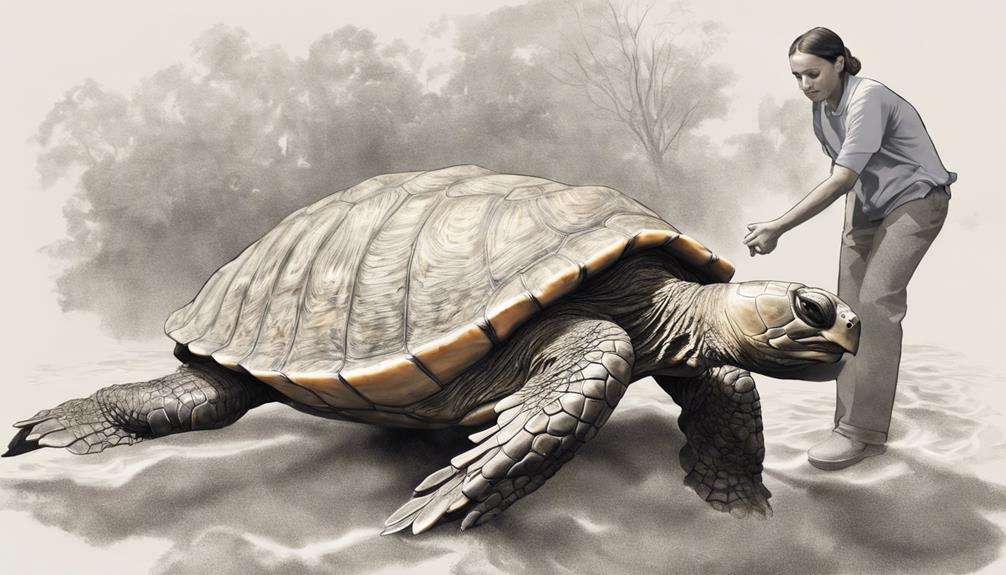
When handling your turtle, remember to always support its body properly with both hands to prevent injuries or stress. Excessive handling can lead to stress-related health issues, so it's important to be mindful of the frequency and duration of interactions.
Utilize slow and gentle movements when picking up or interacting with your turtle as this helps build trust and prevents anxiety. If your turtle shows signs of distress, allow it to retreat into its shell to feel safe and secure.
To acclimate your turtle to human interaction and reduce fear, engage in regular but brief handling sessions. By approaching your turtle with care and consideration, you can create a positive and stress-free handling experience that benefits both you and your shelled companion.
Preventive Health Measures for Exotic Turtles
To guarantee the high-quality health and well-being of your exotic turtle, prioritize regular veterinary check-ups as an important preventive measure. Regular check-ups are essential for monitoring your exotic turtle's health and addressing any potential issues promptly.
Alongside veterinary care, providing a well-balanced diet is critical. Make sure your exotic turtle's diet includes the right mix of protein and plant matter to support its overall health.
Maintaining proper tank conditions is also key. Monitor and regulate factors like temperature, lighting, and water quality to create a habitat that promotes your exotic turtle's well-being.
In addition to diet and tank conditions, observing your exotic turtle's behavior is a preventive health measure. Regularly monitor its activity levels and habits, as any changes could indicate underlying health concerns.
Implement good hygiene practices to prevent the spread of disease and maintain a healthy environment for your exotic turtle.
Common Health Issues in Rare Turtles

Regularly monitoring the health of rare turtles is essential, as they're susceptible to various common health issues that require specialized care and attention. Shell infections, respiratory issues, and metabolic bone disease are prevalent among rare turtles due to improper care. These health issues can manifest as shell rot, vitamin deficiencies, and parasitic infections, having a profound impact on the overall well-being of these unique creatures.
To prevent such ailments, it's important to provide specialized diets tailored to their specific nutritional needs, guarantee proper UV lighting for metabolic processes and shell health, and maintain high water quality to prevent infections. Ignoring these factors can lead to severe consequences such as shell deformities, organ failure, and even premature death.
Veterinary care for rare turtles should involve specialists well-versed in the intricacies of their species to effectively address any emerging health concerns before they escalate. Stay vigilant in observing your rare turtle's health to ensure a long and healthy life.
Holistic Approaches to Turtle Wellness
Holistic care for your turtle involves incorporating natural remedies like herbal supplements and essential oils to enhance their overall well-being. In addition to these remedies, providing a stress-free environment with proper lighting, temperature, and hiding spots is important for your turtle's holistic wellness. Ensuring clean water for swimming and hydration, maintaining the ideal temperature in their habitat, and offering a balanced diet rich in live foods such as insects and earthworms are all essential aspects of holistic turtle care.
Regular exercise is also important for your turtle's well-being. Consider providing supervised outdoor time or encouraging swimming sessions to promote physical fitness and mental stimulation. Engaging in activities like shell massages and gentle handling can further strengthen the bond between you and your pet turtle, promoting emotional wellness for both of you.
Emergency Care Tips for Exotic Turtles
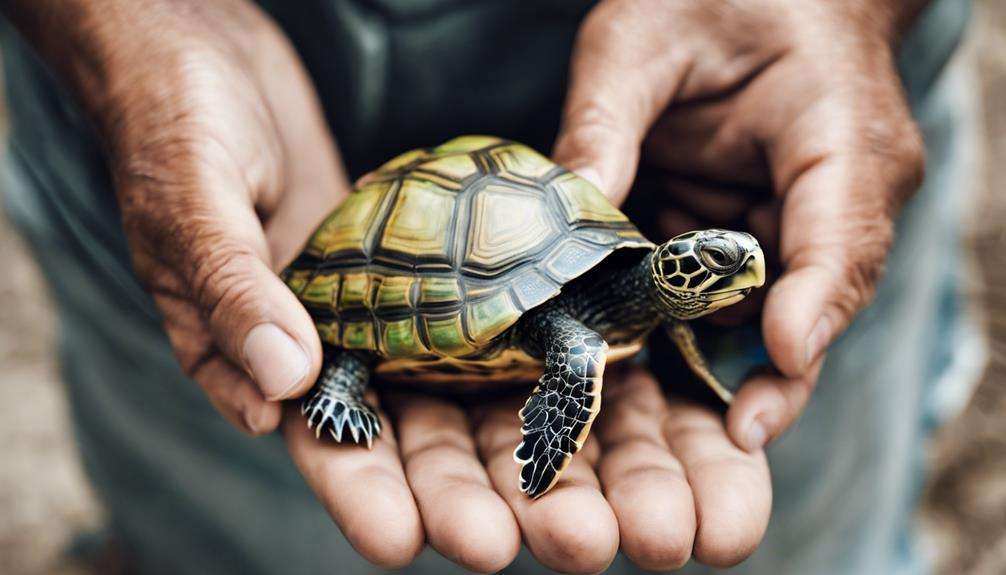
If your exotic turtle is in distress, remember quick first aid measures can make a significant difference in their outcome. Having your vet's contact information readily available is important for emergencies – save it in your phone or keep it in an accessible place.
Learn safe transport methods beforehand, so you can swiftly and safely get your turtle to the vet if needed.
Quick First Aid
In emergencies, having a well-prepared reptile first aid kit with essential items like betadine solution, sterile gauze, and tweezers is crucial for promptly tending to your exotic turtle's injuries.
For shell injuries, gently clean the area with diluted betadine and apply antibiotic ointment before seeking veterinary help.
In cases of respiratory distress, guarantee proper ventilation, maintain warmth, and seek immediate veterinary assistance.
Treat minor cuts or wounds with betadine solution and monitor for signs of infection like redness, swelling, or discharge.
If your turtle ingests something toxic, contact a reptile vet immediately and provide details on the ingested substance for appropriate treatment.
Vet Contact Information
When managing emergencies for your exotic turtle, having the contact information of a knowledgeable vet experienced in treating reptiles is paramount for ensuring prompt and specialized care. Exotic turtles have specific health needs that may require immediate attention from an exotic animal vet.
It's essential to watch for signs of illness in your turtle, such as changes in behavior, appetite, or shell condition, and contact your vet promptly if any concerns arise. Emergency care for exotic turtles may involve specialized treatments and diagnostics that only an experienced reptile vet can provide.
Safe Transport Methods
For ensuring the safe transport of your exotic turtle during emergencies, prioritize using a secure and well-ventilated container. Choose a container that's made of non-toxic materials and has a secure lid to prevent any escapes.
It's important to maintain a stable temperature in the container to prevent unnecessary stress on your turtle. When handling your turtle during transport, remember to do so gently and avoid sudden movements to minimize any additional stress.
If your turtle shows signs of distress or injury during transport, seek immediate veterinary care to make sure its well-being. By following these guidelines and being prepared, you can safely transport your exotic turtle during emergencies.
Frequently Asked Questions
How Do I Make Sure My Turtle Is Healthy?
To guarantee your turtle's health, monitor weight stability, check shell condition, examine eyes for clarity, watch for behavior changes, and schedule veterinary check-ups. Maintain proper habitat, provide UV lighting, a balanced diet, clean water, exercise, mental stimulation, and temperature control.
What Do Turtles Need to Thrive?
To thrive, turtles need proper heating, adequate lighting, clean environment, nutritious diet, regular exercise, mental stimulation, social interaction, and preventive care. Ensuring these elements will keep your turtle healthy and happy for years to come.
What Is the Healthiest Food for Turtles?
For the healthiest food for your turtle, focus on a nutritious diet rich in leafy greens, protein sources like insects, vitamin supplements, adequate calcium intake, and avoiding toxic foods. Guarantee proper hydration and maintain a balanced diet for ultimate health.
What Will Make My Turtle Happy?
To make your turtle happy, you must provide enrichment activities, social interactions, outdoor time, a proper basking area, a varied diet, a clean habitat, regular vet check-ups, and a safe environment. Your efforts will secure your turtle's well-being and contentment.
Conclusion
In conclusion, by implementing these unique turtle care tips, you can secure your exotic pet thrives in best health.
Remember, just like a delicate brushstroke on a canvas, each aspect of care contributes to the masterpiece of your turtle's well-being.
Stay vigilant, stay informed, and give your turtle the love and attention it deserves. Your efforts will be rewarded with a happy and healthy companion for years to come.


